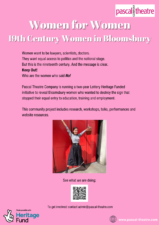Women’s History Seminar,Institute of Historical Research, University of London, Senate House, Malet Street.
Fortnightly, Fridays at 17.15 in Room 203 (John S. Cohen Room) All are welcome.
02 October
Pat Thane (ICBH/King’s), Jill Liddington (CIGS/Leeds) and Elizabeth Crawford (Independent Scholar), Vanishing for the Vote: The Suffragette Boycott of the 1911 Census
The seminar explores the significance of the 1911 suffragette census boycott. On the one hand, the census was designed to provide accurate data to underpin much-needed health and welfare reforms. On the other, suffragette organizations incited women, all still unenfranchised, to boycott this census. They were urged either to evade the enumerator by hiding away in darkened houses; or to resist ~ defiantly inscribing ‘No Vote No Census’ onto their schedule. Many women did indeed boycott. Yet many decided to comply and handed over a perfectly accurate census schedule. Based upon Jill Liddington’s Vanishing for the Vote (MUP, 2014), this seminar analyzes the ‘battle for the census’ arguments that raged across Edwardian England in spring 1911, and is illustrated by individual schedules ~ which can still be read in the head of family’s own hand.
16 October
Rebecca Whiteley (UCL) Figuring Pictures and Picturing Figures: Early Modern Images of the Unborn Child and the Pregnant Body
How women in early modern England experienced and understood their bodies, especially in pregnancy and childbirth, has been a topic of great interest for historians in recent years. And while much has been done with a great range of textual sources, from court records and midwives’ account books to printed midwifery manuals, comparatively little sustained attention has been paid to images in this context. Images of the pregnant body and the unborn child, especially ‘birth figures’ depicting possible fetal presentations, were commonly found in popular midwifery manuals in the late-sixteenth and seventeenth centuries. These images found a wide viewership among men and women, professional and lay, and they gave these viewers an entirely new vision of the inaccessible bodily interior. Focussing particularly on female viewers, this paper will examine how these images can be understood to have both reflected and affected the ways in which contemporary viewers understood and visualised the pregnant body and the unborn child.
30 October
Pamela Schievenin (Glasgow) ‘Every woman’s destiny is motherhood’: Women and Work in Post-War Italy (1945-1970) [Postponed from an earlier date]
Women in post-war Italy were presented with different interpretations regarding women’s work outside the house. The view promoted by the Catholic Church, which emphasised the maternal role of women and condemned female employment, appeared dominant. Yet women were also exposed to discourses which presented female employment as a positive and valid choice. This paper discusses these diverse models of femininity and traces how they evolved as the country moved towards industrialization and modernization. Through the lens of oral history, the paper also explores whether and to what extent women had the opportunity for constructing their identities outside the home and the family, how they negotiated their individual choices and social expectations, and how they reformulated their identities as working women.
13 November
Kelly Spring (Manchester) ‘Keep Calm and Carry On’: The Public Memory of Second World War Food Rationing and Gender History in the Imperial War Museum
There are almost daily reminders of the Second World War in some cultural form or another in Britain, including the recent popularity of the ‘Keep Calm and Carry On’ posters, rebroadcasts of Dad’s Army on television, and yearly commemorations and celebrations. Continual depictions of the war in modern-day media are often shaped along the lines of a sexual division of labor, projecting hegemonic masculinity and domestic femininity. Margaretta Jolly suggests such a division is replicated in museums like the Imperial War Museum, depicting different war histories for men and women. Taking Jolly’s research as my starting point, this paper assesses recent presentations of war in the IWM to determine how gender history is being configured in twenty-first century public settings. Specifically, the paper examines the Imperial War Museum’s representations of food rationing in the ‘Ministry of Food’ exhibition (2010-2011) and the ‘Horrible Histories Rotten Rationing’ big picture show (2013-2015) to investigate if a gender division exists within these displays on rationing. It argues that wartime roles associated with food rationing are not fixed gender constructions within public memory, but complex and fluid configurations that result from the confluence of personal and situational contexts.
27 November
Eve Worth (Oxford) ‘I’m not really political, but…’: Women’s Political Subjectivity in Postwar Britain
This paper uses the oral history interviews conducted for my DPhil thesis as the evidence base to explore women’s ‘political subjectivity’. The thesis starts from the position that all women are political subjects and the aim has been to find the conceptual tools to analyse how this plays out in the articulation of selfhood. The interviewees were not chosen because they were involved in party politics or activism, although some were, but because they were women born between dates that place them firmly within the realm of postwar experience. The choice of postwar is important; the period witnessed considerable social and political change which Celia Hughes has argued can be linked to a shift in the structure of feeling. The topics discussed in this paper include political philosophy, class and paid work. These aspects have emerged as important in the course of the research into political subjectivity for they link to the understanding of the self within public matrices of power. Selina Todd has recently re-emphasised the Thompsonian notion of class as a ‘power relationship’ rather than a ‘thing’. In this paper I suggest that we need to imbue the idea of the ‘political’ in women’s life stories with a similar pervasive and relational meaning.
Women’s History Seminar webpage
Institute of Historical Research location webpage
